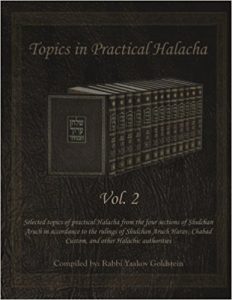
This Article is an excerpt from our Sefer
Buy here or on Amazon.com
Mekach Taus-The Torah’s Return policy on spoiled food products:
The Torah law: [The following law applies in all jurisdictions which do not contain consumer laws legislated on this issue:] One who purchased a food product and discovered that it was spoiled at the time of purchase, is entitled to receive a full cash refund for the product from the seller.[1] [According to Ashkenazim] this applies even if the seller is a merchant who himself purchased the product from the manufacturer, nevertheless, he is liable to personally refund the purchase from the buyer.[2] [Thus, the seller cannot tell the buyer to speak to the company manufacturer for a return. However, according to Sephardim, the seller has the right to refuse the refund, and send him to the original seller for his refund claim.[3]] This applies even if the store has a no return policy on foods, fruits or vegetables, and the buyer was made aware of this at the time of purchase.[4] This, however, only applies if the food was already spoiled at the time of purchase.[5] In a case where one is unsure, the burden of proof is on the one asking for the payment, which in a regular situation, is the consumer.[6] [In all cases that the seller is liable to accept a return, he must refund the buyer with money, and not with store credit, unless the seller does not have any money to give.[7]]
The State law:[8] The above Halacha is only in effect in an area that does not contain any consumer laws regarding the issue of returns on spoiled food products. If, however, the State in which the purchase took place, contains consumer laws and policies which are accepted upon that area, then the laws of returning a product follow all those laws and regulations for all purposes, unless explicitly stated otherwise by the buyer to the seller at the time of purchase. [Thus, if a certain State has a policy of no returns on food products, even if found to be spoiled from the time of purchase, then this policy overrides the Halacha, and the seller does not have to reimburse the buyer. Likewise, if the State law permits the seller to reimburse the buyer with store credit, then he may choose to do so.]
The store policy: As stated above, a store return policy that is not legally protected by State law, is not binding on the consumer, and he reserves the right to return a food product that was spoiled from the time of purchase and receive reimbursement.
|
Summary: In all areas absent of consumer law and regulations regarding the return of spoiled food products, the buyer has the Halachic right to demand a cash refund for his food product, from the store, if it was spoiled at the time of purchase. If the buyer already paid for the product, the burden of proof regarding when the spoilage occurred falls on him. The personal policy of the store does not carry any legal Halachic weight in this regard. In jurisdictions with consumer policy laws regarding return of food products, all the laws are Halachically binding on the buyer and seller.
|
________________________________________________________________________
[1] Michaber C.M. 232:3 regarding general law; 230:7 regarding spoiled beer; 232:16 regarding spoiled cheese; 232:19 regarding bloody eggs
If only some of the item was spoiled: The above law only applies if the item is sold individually, such as one purchased a watermelon, and it was spoiled, or one purchased milk, and one of the cartons were spoiled. If, however, one purchased a bag of fruits, vegetables, and the like, and some of them were spoiled, then this matter is dependent on several factors, as explained in Michaber and Rama C.M. 229:1-2.
[2] Rama C.M. 232:18; Tur in name of Rosh; Aruch Hashulchan 232:30
Other opinions: Some Poskim rule the merchant may send the buyer to the original manufacturer for a refund. [Michaber 232:18] According to this ruling, all food chain stores may tell the buyer to speak to the food company for a return.
[3] See other opinions in previous footnote
[4] Michaber C.M. 232:7; Aruch Hashulchan 232:11
[5] See Michaber C.M. 232:11; Aruch Hashulchan 232:17
[6] Michaber ibid; Aruch Hashulchan ibid
[7] Aruch Hashulchan C.M. 232:37
[8] Michaber C.M. 232:6 that we follow the Minhag Hamedina regarding the definition of a Mum, and Michaber 232:19 that the Minhag is not to accept returns on eggs, and Minhag Mivatel Halacha! See Aruch Hashulchan 232:7 and 30



Leave A Comment?
You must be logged in to post a comment.